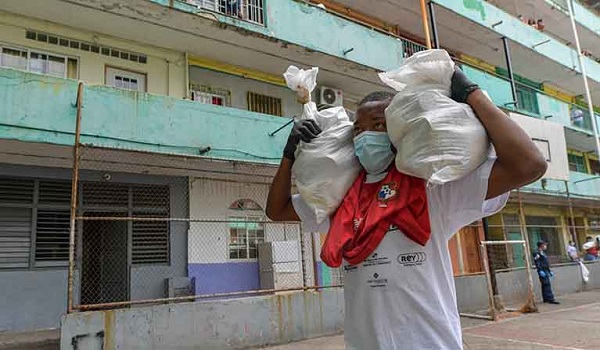The COVID-19 pandemic is having a catastrophic effect on working hours and earnings, globally. A new ILO report highlights some of the worst affected sectors and regions, and outlines policies to mitigate the crisis.
GENEVA – The COVID-19 crisis is expected to wipe out 6.7 per cent of working hours globally in the second quarter of 2020 – equivalent to 195 million full-time workers.
Large reductions are foreseen in the Arab States (8.1 per cent, equivalent to 5 million full-time workers), Europe (7.8 per cent, or 12 million full-time workers) and Asia and the Pacific (7.2 per cent, 125 million full-time workers).
Huge losses are expected across different income groups but especially in upper-middle income countries (7.0 per cent, 100 million full-time workers). This far exceeds the effects of the 2008-9 financial crisis.
The sectors most at risk include accommodation and food services, manufacturing, retail, and business and administrative activities.
The eventual increase in global unemployment during 2020 will depend substantially on future developments and policy measures. There is a high risk that the end-of-year figure will be significantly higher than the initial ILO projection, of 25 million.
More than four out of five people (81 per cent) in the global workforce of 3.3 billion are currently affected by full or partial workplace closures.
“Workers and businesses are facing catastrophe, in both developed and developing economies,” said ILO Director-General Guy Ryder. “We have to move fast, decisively, and together. The right, urgent, measures, could make the difference between survival and collapse.”
The ILO Monitor 2nd edition: COVID-19 and the world of work , which describes COVID-19 as “the worst global crisis since World War II”, updates an ILO research note published on 18 March. The updated version includes sectoral and regional information on the effects of the pandemic.
According to the new study, 1.25 billion workers are employed in the sectors identified as being at high risk of “drastic and devastating” increases in layoffs and reductions in wages and working hours. Many are in low-paid, low-skilled jobs, where a sudden loss of income is devastating.
Looked at regionally, the proportion of workers in these “at risk” sectors varies from 43 per cent in the Americas to 26 per cent in Africa. Some regions, particularly Africa, have higher levels of informality, which combined with a lack of social protection, high population density and weak capacity, pose severe health and economic challenges for governments, the report cautions.
Worldwide, two billion people work in the informal sector (mostly in emerging and developing economies) and are particularly at risk.
Large-scale, integrated, policy measures are needed, focusing on four pillars: supporting enterprises, employment and incomes; stimulating the economy and jobs; protecting workers in the workplace; and, using social dialogue between government, workers and employers to find solutions, the study says.
“This is the greatest test for international cooperation in more than 75 years,” said Ryder. “If one country fails, then we all fail. We must find solutions that help all segments of our global society, particularly those that are most vulnerable or least able to help themselves.”
“The choices we make today will directly affect the way this crisis unfolds and so the lives of billions of people,” he added. “With the right measures we can limit its impact and the scars it leaves. We must aim to build back better so that our new systems are safer, fairer and more sustainable than those that allowed this crisis to happen”.
Source: ILO Website
ilo.org

